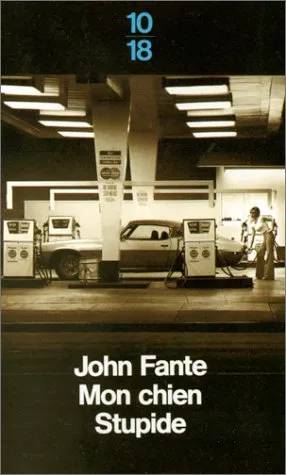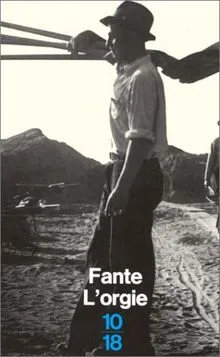John Fante’s My Dog Stupid is far more than just a story about a canine companion; it’s a poignant and often darkly humorous exploration of middle age, disillusionment, and complex family dynamics, all seen through the lens of a highly unconventional pet. Published posthumously as part of the West of Rome collection, this novella has gained renewed attention, particularly among those who appreciate Fante’s unique voice and unflinching portrayal of human nature. For readers seeking a “My Dog Stupid Book” that delves deep into the often-challenging relationship between humans and their pets, this work offers a compelling, if sometimes unsettling, perspective. It invites us to consider how animals can profoundly impact, and even disrupt, the delicate balance of a household, reflecting our own unspoken desires and anxieties.
The World of Henry Molise: A Disillusioned Screenwriter’s Life
Set in the sun-drenched, yet emotionally arid, landscape of Point Dune, California, during the late 1960s or early 1970s, My Dog Stupid introduces us to Henry Molise. At 55, Henry is a semi-retired screenwriter, currently unemployed and adrift, grappling with the perceived failures of his life. He has been married to Harriet for twenty-five years, and together they have four children: Dominic, Tina, Denny, and Jamie. Despite his long marriage and family, Henry views his life with a palpable sense of ennui and thinly veiled contempt, often expressing a desire to exchange his children for a new sports car. He is an insufferable, yet strangely captivating, character – loud, obnoxious, and prone to volatile outbursts. His internal monologue reveals a man deeply dissatisfied, struggling to connect with his burgeoning adult children who are each navigating their own paths, often in ways that displease him. From Dominic’s stalled acting ambitions to Tina’s choice of boyfriend and Denny’s interracial relationship, Henry finds constant reasons for disdain.
Henry’s character is painted with a cynicism that feels both raw and authentic, a trait that resonated with authors like Charles Bukowski, who championed Fante’s work. Henry’s perspective on his family, and indeed the world, is skewed, leading to frequent misunderstandings and emotional turmoil. Harriet, his wife, embodies the eternal peacemaker, often mediating between the children and their abrasive father. This backdrop of simmering domestic tension sets the stage for the arrival of an unexpected guest, who will push the family’s already strained dynamics to their breaking point. Readers of classic literature might find echoes of similar family struggles, perhaps even finding parallels to the complexities explored in [charles bukowski love is a dog from hell](https://dogcarestory.com/charles-bukowski-love-is-a-dog-from-hell/), where relationships are often gritty and far from idealized.
Stupid’s Grand Entrance: A Catalyst for Chaos
The narrative takes a sharp turn with the discovery of an Akita dog sprawling on Henry’s lawn. Henry, impulsively, takes the animal in and names him “Stupid.” From this moment, the seemingly ordinary household is plunged into a delightful, chaotic disarray. Stupid, much like Henry himself, is an unrefined and unpredictable force. He exhibits a peculiar habit of humping male humans, particularly Rich, Tina’s surfer boyfriend, much to Henry’s secret amusement and open disdain. This single, unusual trait of Stupid’s becomes a recurring comedic and symbolic device, exacerbating the existing tensions within the Molise family. The dog’s presence acts as a direct challenge to Henry’s control and the family’s fragile peace, forcing confrontations and revealing underlying resentments.
 A striking Akita dog, similar to the one depicted in My Dog Stupid, resting calmly on a green lawn.
A striking Akita dog, similar to the one depicted in My Dog Stupid, resting calmly on a green lawn.
Henry’s decision to keep Stupid, despite his children’s protests and the dog’s disruptive behavior, highlights his obstinate nature and his yearning for a semblance of control or victory in his life. The dog becomes a focal point for the children’s rebellion, yet Henry remains steadfast, digging in his heels against their wishes. This dynamic underscores Fante’s genius in using a seemingly simple premise—getting a dog—to unravel deeper psychological threads. The character of Stupid, while a canine, mirrors many of Henry’s own less desirable traits, making their bond both repulsive and strangely understandable. The animal acts as a mirror, reflecting Henry’s own wild, untamed desires and frustrations back at him, adding layers of self-discovery to a narrative that initially appears to be just about a “stupid” dog.
More Than Just a Pet: Stupid as a Symbol
In a revealing internal monologue, Henry explicitly states his reasons for wanting Stupid: “I was tired of defeat and failure. I hungered for victory.” For Henry, Stupid embodies the unwritten books, the unseen places, the unowned Maserati, the women he craved, and the “great offspring with fine minds.” The dog becomes a symbolic repository for all of Henry’s unfulfilled ambitions and lost dreams. This profound insight elevates My Dog Stupid beyond a mere domestic comedy to a study of a man confronting his aging self and the choices he’s made. The dog isn’t just a pet; he’s a manifestation of Henry’s psyche, a tangible form for his anxieties about the approaching empty nest syndrome.
Henry observes his children gaining “meal independence” and the slow but inevitable process of them moving out. Despite his frequent complaints and disdain for his offspring, there’s an underlying fear of abandonment, a dread of the quiet house once they are gone. Stupid inadvertently helps Henry process these emotions, acting as a disruptive, yet oddly comforting, presence. Many literary critics suggest that My Dog Stupid contains strong autobiographical elements. John Fante, like Henry, was a semi-successful screenwriter who enjoyed golf. His wife, Joyce, like Harriet, had her own financial means and a saintly patience. The Fantes also had four children, three sons and a daughter. If the book reflects their home life, it suggests Fante himself might have been a challenging man to live with, imbuing Henry’s character with an undeniable authenticity. For those who [read books online free dog man](https://dogcarestory.com/read-books-online-free-dog-man/) or similar narratives exploring the complexities of human-animal bonds, Fante’s work offers a more mature and nuanced perspective.
A Contrast in Novellas: “The Orgy” and Fante’s Broader Themes
While the primary focus for our keyword “my dog stupid book” is on the titular novella, West of Rome also includes The Orgy, a distinct piece that showcases Fante’s versatility. The Orgy transports readers to Colorado in 1925, following a ten-year-old narrator and his Italian-American family. Here, the familial conflict centers on the father, Nick, a bricklayer, and his friendship with Franck Gagliano, an atheist who clashes with the narrator’s devout Catholic mother. This novella, like My Dog Stupid, delves into the internal struggles of family members caught between conflicting ideologies and personalities, though without a canine protagonist.
 A vintage illustration or painting, likely representing a family or group of people in the 1920s, reflecting the setting of The Orgy.
A vintage illustration or painting, likely representing a family or group of people in the 1920s, reflecting the setting of The Orgy.
Fante’s writing throughout both novellas is characterized by his keen eye for description, a surprising fondness for his often-unlikable characters, and a wonderful sense of humor. His prose is sharp and evocative, whether he is detailing Henry’s absurd grocery shopping expedition or the narrator’s observations of his father in The Orgy. He has an ability to capture the mundane aspects of life and infuse them with a unique, often ironic, perspective. Many readers, particularly those looking to [read dog man books for free](https://dogcarestory.com/read-dog-man-books-for-free/) or other narratives that blend humor with insightful character studies, would find Fante’s style both engaging and thought-provoking. His mastery lies in crafting characters that feel undeniably real, with all their flaws and eccentricities, making their stories resonate long after the final page.
Conclusion
John Fante’s My Dog Stupid is a masterclass in character study, deftly using the arrival of an unconventional dog to unravel the intricate, often messy, dynamics of a family teetering on the brink of change. For anyone searching for a “my dog stupid book” that goes beyond a simple pet story, this novella offers a rich literary experience, filled with dark humor, poignant observations, and deeply flawed, yet human, characters. It’s a testament to Fante’s enduring talent that such a seemingly simple premise can yield such profound insights into human nature, aging, and the surprising ways our animal companions can hold a mirror up to our souls. Whether you’re a long-time Fante admirer or discovering his work for the first time, My Dog Stupid promises a compelling and memorable read, reminding us that sometimes, the most challenging pets are the ones who teach us the most about ourselves. We encourage you to explore this fascinating literary work and discover other insightful articles about the complex world of pets and their humans on Dog Care Story.
